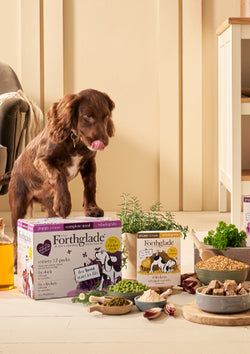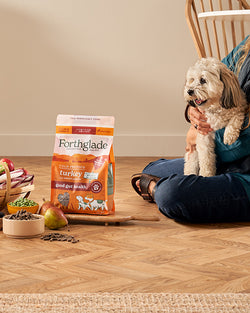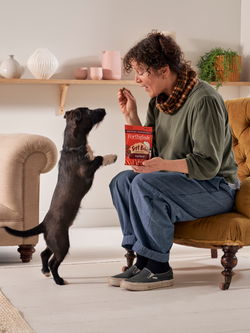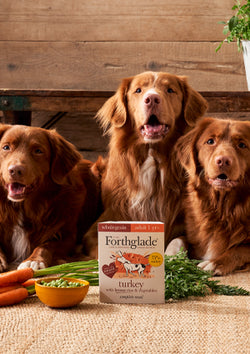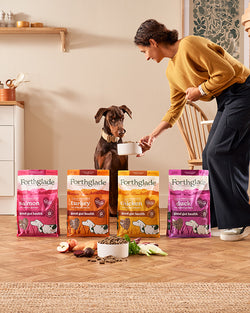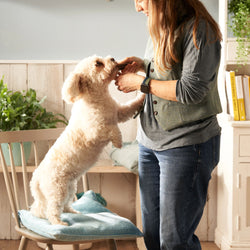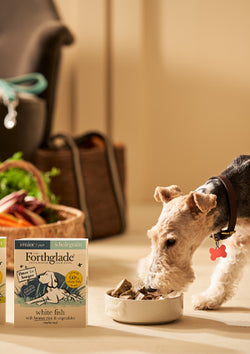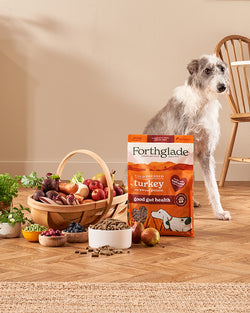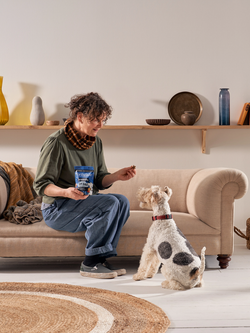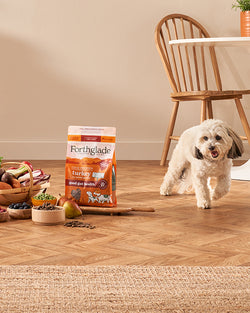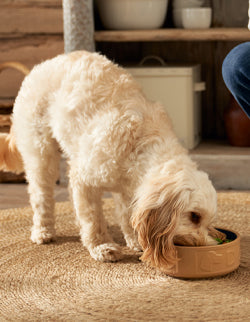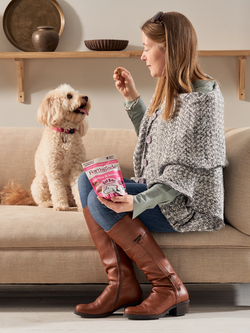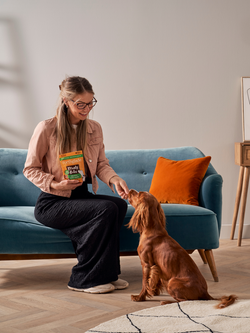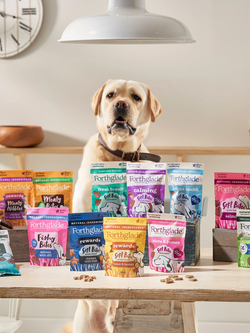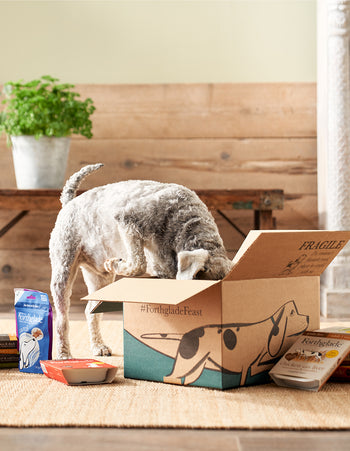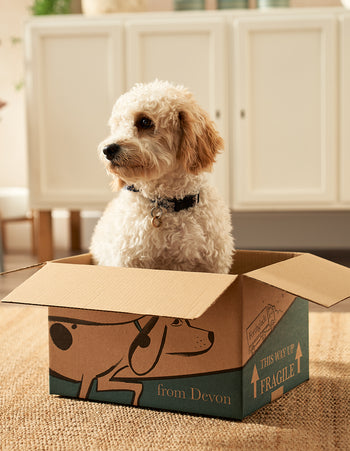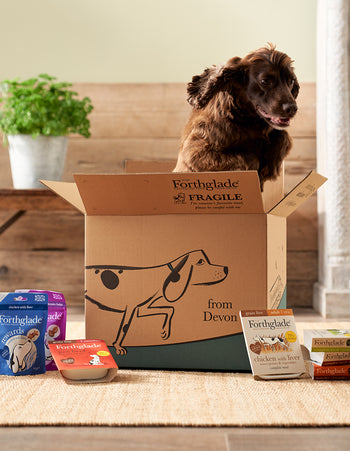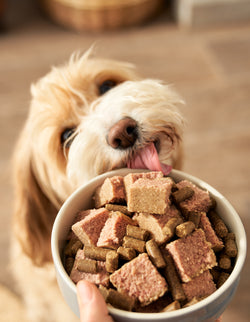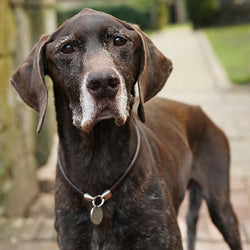Can Dogs Eat Human Food?
It’s a question every dog owner has asked at some point, can I give my dog a bite of my dinner? While there are certain human foods that are safe for dogs to enjoy in moderation, it’s important to remember that your furry friend’s nutritional needs are very different from your own.
Feeding human food to dogs isn’t necessarily harmful, but it needs to be done with care, consideration, and plenty of knowledge. A little treat now and then can be a lovely way to bond with your pup, but too much can cause tummy troubles, bad habits, and even long-term health issues.
Let’s take a look at the pros, cons, and best practices when it comes to feeding human food to your dog.

Should You Feed Your Dog Human Food?
Not all table scraps are created equal and what’s harmless to us can be quite the opposite for dogs. Before handing over a snack from your plate, there are a few things to think about
Digestive Problems
Dogs have much shorter digestive tracts than humans, and their bodies are designed to process a diet primarily made up of meat protein and some plant matter. Rich, fatty, or heavily seasoned foods can quickly upset their stomachs and cause symptoms such as vomiting, diarrhoea, or constipation.
Common signs of an upset stomach include:
- Lack of appetite
- Loose stools
- Excessive gas
- Lethargy
To learn more:
Why is my dog being sick blog
Why does my dog have diarrhoea
Toxic Foods
Many everyday human foods are actually toxic to dogs and even small amounts can lead to serious health problems. It's crucial to know what’s safe and what’s not before offering any human food as a treat.
Here’s a quick guide:
| Safe in Moderation | Avoid Completely |
| Cooked lean meats (chicken, turkey) | Chocolate |
| Carrots | Grapes & raisins |
| Apples (no seeds) | Onions & garlic |
| Peanut butter (xylitol-free) | Macadamia nuts |
| Blueberries | Alcohol |
| Pumpkin | Caffeinated drinks (tea, coffee) |
| Cooked sweet potatoes | Artificial sweeteners (e.g. xylitol) |
| Plain rice or pasta |
Raw dough |
Want to learn more? Check out:
What vegetables can dogs eat
What fruits can dogs eat

Weight Gain
While the occasional treat won’t do much harm, regularly adding human food on top of your dog’s normal diet can quickly lead to unnecessary weight gain. Obesity in dogs is a growing problem, leading to issues like joint pain, heart disease, and reduced lifespan.
Stick to proper portion sizes and consult our dog feeding advice for guidance.
Begging
Feeding your dog from the table, no matter how sweet those puppy eyes are can encourage bad habits. If your dog learns that scraps are handed out during mealtimes, they’re more likely to develop persistent begging behaviour that’s hard to unteach later on.
How To Treat Your Dog in Moderation
If you’d like to share a few healthy human foods with your dog every now and then, there are some simple rules to keep things balanced and safe:
- Keep it occasional: Treats, human or otherwise should make up no more than 10% of your dog’s daily calorie intake.
- Avoid processed or seasoned food: Skip anything with added salt, sugar, spices, or sauces. A plain cooked piece of chicken is a much better option than a slice of pizza!
- Size matters: Always cut treats into small, manageable portions, especially for smaller breeds.
- Stick to known safe options: Use our table above to guide your choices or when in doubt, choose from our range of healthy dog treats made with 100% natural ingredients.
- Watch for reactions: If trying a new food, offer a small amount first and monitor your dog for any signs of digestive upset.
-
Feed during appropriate times: Avoid feeding human food from your plate, instead, offer it as a reward during training sessions or added to a regular mealtime.

Choose the Healthiest Food for Your Dog
While it’s tempting to treat your dog like one of the family at mealtimes, the healthiest and most balanced way to nourish them is with food that’s specially formulated for their needs. We believe dogs deserve naturally nourishing meals made with simple, wholesome ingredients. That’s why all our recipes are free from artificial additives and fillers – just natural food for happy, healthy dogs.
Whether you're looking for complete meals, natural treats, or puppy-friendly options, we’ve got everything you need to keep tails wagging.
Shop Healthy Dog Food






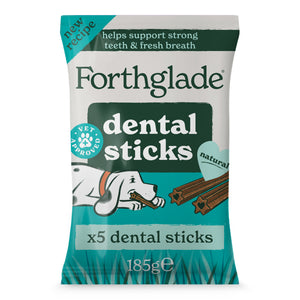
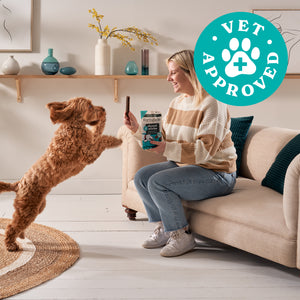
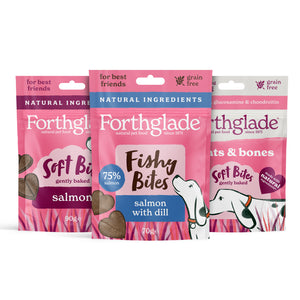
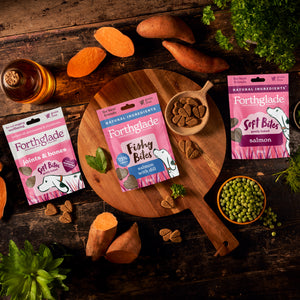


 FAST & FREE DELIVERY ON ORDERS £40+*
FAST & FREE DELIVERY ON ORDERS £40+*
 SUBSCRIBE TO SAVE 10% OFF EVERY ORDER
SUBSCRIBE TO SAVE 10% OFF EVERY ORDER
 OVER 13,600 5 STAR REVIEWS
OVER 13,600 5 STAR REVIEWS


